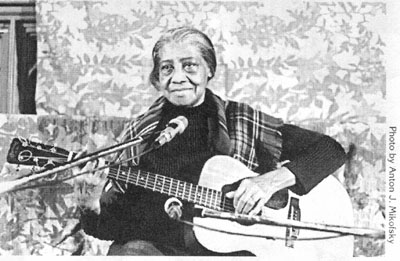|
Elizabeth Cotten short biography
in Japanese |
frontpage | short biography | lyrics | discography | videography | influences | Dylan sings Cotten | links
 |
|
(January 5, 1895 - June 29, 1987) Born in Chapel Hill, North Carolina on January 5, 1895. One of four children of George Nevills and Louise Price Nevills. At about the age of eight, started playing her older brother's Banjo and, a little later, brother's hidden guitar. When he was out she would pull the guitar from under his bed and set it flat on her lap. At first she developed her picking pattern, with her left hand, then chording and then some of the easier part of Wilson Rag. She saved money and finally got her own guitar, 'Stella'. To learn a new tune she needed only to hear it played once by other musicians around her town. Her brothers and sister could also play. Sometimes they would play homemade instruments around the house for themselves and friends.
"where I lived the freight train would keep me awake at night.
I started writing about what it was doing there." wrote a song Freight Train with 'Stella'. She was twelve years old.
Started doing housework, in Chapel Hill area just like her mother did. At various points Elizabeth, Frank and Lillie moved back and forth between Washington D.C., Chapell Hill and NYC. Then Frank moved to NYC where he had job as a chauffeur (and later operated his own garage shop on South Broadway). Elizabeth and Lillie moved to NYC to be with him and they lived there for about three years. Lillie went to school in Yonkers and Elizabeth worked in a furniture shop. When Lillie got married Elizabeth got divorced. Since early 1940, she lived with her daughter and 5 grandchildren in Washington D.C.
In 1946 or 1947, when she worked in a Lansburgh's department
store, found Peggy Seeger, who was
lost and brought her back to her mother Ruth Crawford Seeger.
Late 1957 to early 1958, recorded at a bedroom in Elizabeth's
home in Washington D.C. Mike Seeger
visited about a half dozen times for the recording.
In January 1960(1959?), her first concert with Mike Seeger at
a joint performance at Swarthmore Collage. Then manytimes with the New Lost City Ramblers(over the years), sometimes with (Mississippi) John Hurt of John Jackson and sometimes by her self. She played at various folk festivals among other "discovered" musicians such as John Lee Hooker, Jesse Fuller and Muddy Waters.
1961, University of Chicago Folk Festival
1967, released Shake Sugaree (Folkways)
recorded with her grandchildren, Brenda, Johnny, Sue and Wendy.
Late 1970s, began touring regularly. after John Ullman of Traditional Arts servises began actively organizing her bookings.
late 1980s to early 90s, Received many honors. She was in her
late eighties and early nineties.
1989, chosen as one of 75 influential African-American women to be include
in the photo documentary, I Dream a World (Stewrat, Tabori and Chang. 1989)
June 29, 1987, died in Syracuse, New York at age of 92.
|
|
[Cotten Picking] Elizabeth Cotten plays in basically five styles; first being the ragtime or two finger style for which she is best known. She plays the 3 bass strings with her first finger and the three treble melody strings with her thumb, picking one string at time, alternating between treble and bass (although in her church songs she often plays treble and bass simulation). Her unique sound quality comes in part from the reversal of thumb and finger roles. |
|
|
|
Sources of this bio (linernotes/booklet): |
Biography Links
|
|
I appreciate any kind of correction or informations.
If you'd like to read, there's Elizabeth Cotten biography written in Japanese too.
Nishimura, Itsuko <VFF20242@nifty.ne.jp> |
top
frontpage | short biography | lyrics | discography | videography | influences | Dylan sings Cotten | links